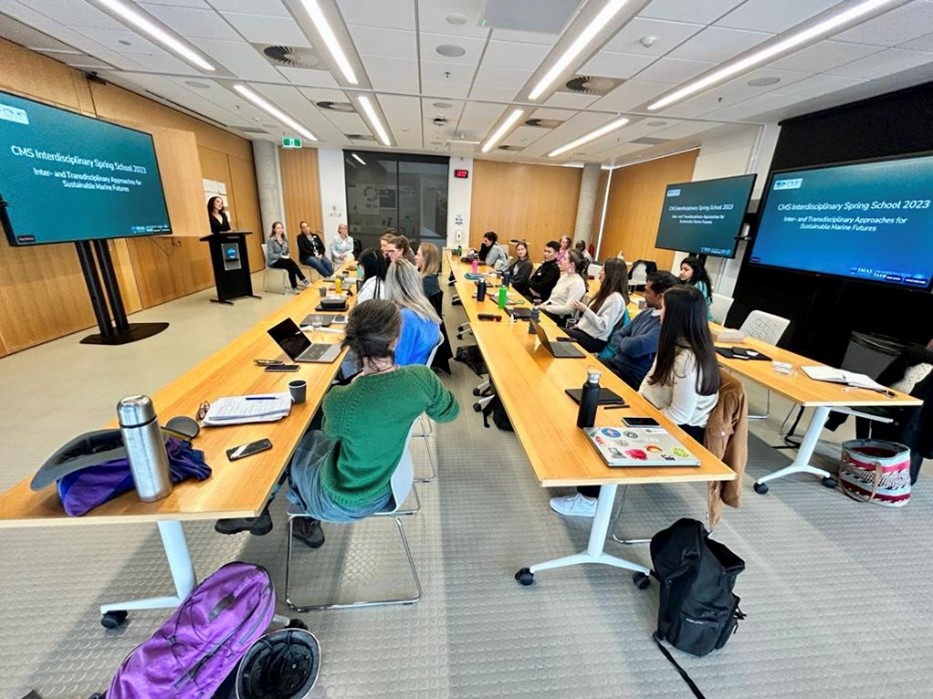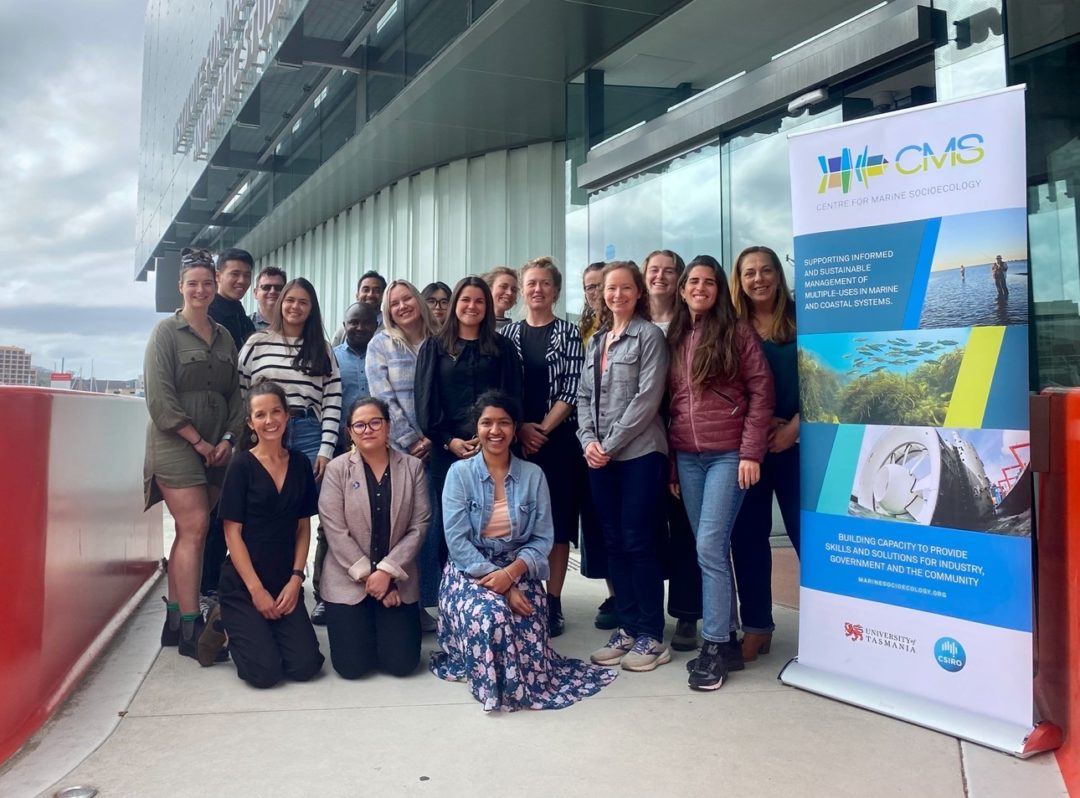The 16th Australia–China Symposium on Marine Sciences for Sustainable Development took place 20–21 November 2023 in Sydney. The symposium showcased both countries’ world leading marine science capabilities, and took place with the support of Department of Industry, Science and Resources, Chinese Academy of Sciences, The Australian Academy of Science, and Australian Academy of Technological Sciences & Engineering (ATSE).
These meetings provide an opportunity to build strong bilateral networks and increase research collaborations between Australia and China. For the first time in this symposia series, Traditional Owners and Indigenous Scientists were able to share their knowledge through a yarning circle (a practice used by Aboriginal and Torres Strait Islander Peoples to sit together to talk and listen from the heart and share ideas and stories).
There was very strong Tasmanian representation, with CMS Director Prof Gretta Pecl presenting, along with Dr Michelle Heupel (IMOS), Prof Nathan Bindoff (IMAS), Prof Chris Carter (IMAS), as well as several other CSIRO people. Dr Valeriya Komyakova (IMAS) attended as an invited ECR/mid career participant, and CMS Deputy Director Dr Beth Fulton (CSIRO) co-organised the event.
See the symposium program here:
CMS would like to extend a huge congratulations to Dr Chloe Lucas on receiving the Tasmanian 2023 Young Tall Poppy of the Year!
Dr Chloe Lucas, is a geographer (Lecturer and Research Fellow in the School of Geography, Planning, and Spatial Sciences, the School of Natural Sciences and the Centre for Marine Socioecology, at the University of Tasmania) whose research focuses on forms of communication that can bridge these divides and improve climate citizenship.
Chloe leads Curious Climate Schools - a project that asks students what they want to know about climate change and matches them with experts to answer their questions. Over the last two years they’ve answered almost 500 questions from 50 classes around Tasmania.
Chloe’s research on bushfire communication has had a tangible impact on communities in Greater Hobart, leading to a partnership of four local governments to trial a new model of bushfire preparedness communication through the ‘Sparking Conversations, Igniting Action’ project.
CMS commitment to listening, learning and acting.
As we are all aware, Australians have now voted in the October 2023 referendum, rejecting a change to the Constitution to recognise the First Peoples of Australia and to establish a body called the Aboriginal and Torres Strait Islander Voice.
Whilst CMS celebrates democracy and acknowledges the decision of the nation, it is clear that misinformation is an enormous challenge in our democracy, and that many Australians are lacking an understanding of the truth of our colonial past and its continuing impact on First Nations people today. We are very disappointed by the outcome. This is particularly since the electoral data very clearly shows that First Nations communities living in remote and regional areas overwhelmingly voted Yes. We recognise the stress and hurt felt my many – in particular, Indigenous colleagues and their families and communities – as a result of public debate surrounding the referendum, and its outcome.
We are heartened that 70% of people in our home municipality of Nipaluna/Hobart voted “Yes”. We are also buoyed by the statement released by the Science and Technology of Australia (https://scienceandtechnologyaustralia.org.au/we-will-continue-to-listen-and-act/), which reads in part “…in the wake of the referendum result, STA re-dedicates ourselves and our community to partner with Aboriginal and Torres Strait Islander people and organisations in STEM to advance the cause of repair, respect and recognition. We renew STA’s longstanding commitment to support, amplify, and elevate Aboriginal and Torres Strait Islander people and organisations in STEM – and highlight the inspiring Indigenous STEM knowledges of this country. You can show your support for STA’s Indigenous member organisations and other Indigenous causes in so many ways.” We are pleased to see such support from the broader scientific community.
Regardless of the referendum outcome, Australia will continue to face challenges to better understand the aspirations of Aboriginal and Torres Strait Islander people for just and empowered lives. We recognise that a powerful opportunity remains for us to realise the generosity and wisdom of the Uluru Statement from the Heart, and to renew our journey toward a shared vision of a better nation for all Australians.
At all levels, it is obvious that we have much more work to do to better connect with each other, and to the people and cultures who have managed the many Countries that make up the land now referred to as Australia for at least 65 000 years. CMS re-commits, strongly, to listening, learning, and working to ensure we can do this in a way that maximises the success and wellbeing of Indigenous people now and into the future.
Download our Voice Statement here.
See related 'IPCC Voices' report here.
The Climate Council’s Code Blue report is now available, with our own CMS Director Prof Gretta Pecl as a coauthor on the report.
Report link: Code Blue: Our Oceans in Crisis | Climate Council
Media interviews with Gretta:
ABC TV Breakfast News interview ABC News Stories : ABC iview
ABC Radio interview with Ryk Goddard at 7.10am yesterday morning Hobart Breakfast - ABC listen (interview starts at 1hr 37mins into recording).
Key Findings of the Report:
1. The health of the planet’s oceans, and human survival, are intrinsically linked.
2. The world’s oceans are absorbing "mind-boggling" amounts of excess heat generated by human-induced global warming.
3. Abrupt and concerning changes to the ocean are now starting to outpace scientific predictions. Experts are deeply worried.
4. Marine heatwaves are becoming more severe and frequent, with devastating consequences for iconic coral reefs, kelp forests and other marine species.
5. Coastal communities across Australia and the Pacific are all threatened by warming oceans and ocean acidification, from robbing us of our big ocean playground, to decimating entire communities.
6. Urgent action is needed to protect our oceans and limit warming, starting with rapidly phasing out coal, oil and gas.
A major UTS project, co-led by CMS member Dr Nick McClean, aims to support better engagement between First Nations communities with connections to oceans and Sea Country, and the Commonwealth government agencies that manage commercial fisheries.
Read more here:
CMS Member Dr Alistair Hobday (CSIRO) features in a Science news article around marine heatwaves.
"When heat waves began to sweep the world’s oceans in June, Alistair Hobday was not surprised. The biological oceanographer had foreseen the coming temperature spikes in forecasting models he’d helped develop. The massive pool of hot water in the northeastern Atlantic Ocean, the coral-killing warmth in the Caribbean Sea, and the sweltering sea in the north Pacific Ocean had all appeared months earlier as orange and red patches on his computer screen at Australia’s Commonwealth Scientific and Industrial Research Organisation (CSIRO). The forecasts, which weren’t widely disseminated beyond fisheries managers and those in the fishing and aquaculture industry, proved to be a prescient warning of what was to come."
In October, CMS hosted its secondary interdisciplinary course – a one-week spring school focusing on Inter- and transdisciplinary approaches for sustainable marine futures.
The Spring School brought together 20 masters and PhD students, Post Doctoral Fellows, and other early career professionals from diverse backgrounds and disciplines (including socio-ecology, law, oceanography, art, ecology, health, and social sciences) to connect and learn about the theory and practice of undertaking inter- and transdisciplinary research. The aim of the course was to equip students with the skills necessary to understand and engage in interdisciplinary marine and climate change research.

Dr Rachel Kelly (CMS Knowledge Broker) hosted and co-ordinated the Spring School.
CMS welcomed visiting researcher Professor Natalie Ban as the Guest Chair of the Spring School. Natalie’s own research is highly inter- and transdisciplinary: spanning geography, resource management and environmental studies, amongst others. Her work is at the forefront of seeking solutions to contemporary challenges related to marine conservation and fisheries.
CMS affiliates, including CMS ECRs, delivered lectures and content across the week on topics including climate change adaptation, systems thinking, grant-writing, working across cultures, and pitching research ideas to stakeholders. In addition, the students worked with Tasmanian marine stakeholders to co-develop interdisciplinary project proposals that sought to address real life stakeholder issues and needs. The students pitched their creative proposals to the stakeholders and their cohort on the last day of the course and received constructive feedback on how to best build on their good ideas to strengthen them.
Thank you to all the CMS affiliates who gave their and energy to delivering content and supporting students over the week. We were thrilled to receive their positive feedback on the Spring School content and course overall. The students’ reflections highlight the value of these kinds of interdisciplinary course, and of the benefits (and fun!) of bringing together researchers and stakeholders to better understand one another and work together.
Special thanks to Dr Hannah Fogarty (CMS Exec Support) for organisation and support
Read more about the course description here: CMS Interdisciplinary Spring School 2023 | Centre for Marine Socioecology
Participant feedback

Dr Rachel Kelly, Prof Natalie Ban, and Prof Gretta Pecl with student cohort.
Western Australian Marine Science Institution (WAMSI) shared a news article ‘Cards, cocktails in yurts and community chats help inspire climate action’ featuring our own Prof Gretta Pecl after her keynote presenting at the 12th International Conference & Workshop on Lobster (and Crab) Biology and Management (ICWL) in Western Australia last week (22-27th Oct 2023).
Her talk, and the article, discuss the challenges of talking about climate change and action with the public.
Read the article here.
Yesterday the Marine Ecosystem Assessment for the Southern Ocean: Summary for Policymakers (MEASO) was launched – co-convened by Dr Andrew Constable, Dr Jess Melbourne-Thomas and Dr Monica Muelbert. This is the first comprehensive interdisciplinary assessment of ecosystem status and trends. It has been a five year initiative with over 200 contributing authors from 19 countries (including many contributors from CMS).
Download report here: https://zenodo.org/records/8359585
See associated Conversation article here: https://theconversation.com/more-than-200-scientists-from-19-countries-want-to-tell-us-the-southern-ocean-is-in-trouble-215529
The countdown is on! A new book on "Brand Antarctica" by CMS member Dr Hanne Nielsen is coming out on 1 December (pre-order available)! It speaks to some of the key CMS themes such as sustainability and human interactions with the environment.
See book here: https://www.combinedacademic.co.uk/9781496221216/brand-antarctica/
Or here: https://www.nebraskapress.unl.edu/nebraska/9781496221216/
Blurb:
"Antarctica is, and has always been, very much “for sale.” Whales, seals, and ice have all been marketed as valuable commodities, but so have the stories of explorers. The modern media industry developed in parallel with land-based Antarctic exploration, and early expedition leaders needed publicity to generate support for their endeavors. Their lectures, narratives, photographs, and films were essentially advertisements for their adventures. At the same time, popular media began to use the newly encountered continent to draw attention to commercial products. These advertisements both trace the commercialization of Antarctica and reveal how commercial settings have shaped the dominant imaginaries of the place.
By contextualizing and analyzing Antarctic advertisements from the late nineteenth century to the present, Brand Antarctica identifies five key framings of the South Polar continent: a place for heroes, a place of extremity, a place of purity, a place to protect, and a place that transforms. Demonstrating how these conceptual framings of Antarctica in turn circulate through our culture, Hanne Elliot Fønss Nielsen challenges common assumptions about Antarctica’s past and present, encouraging readers to rethink their own relationship with the Far South."